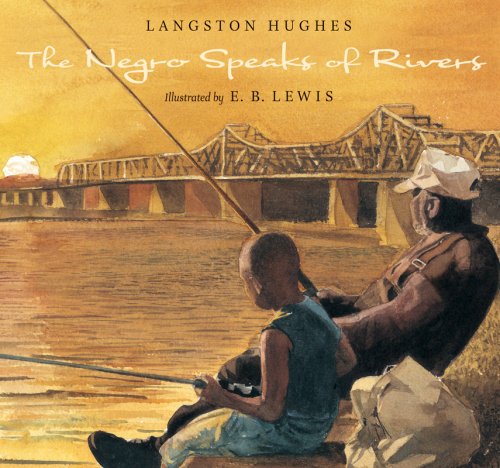I've known rivers:
I've known rivers ancient as the world and older than the
flow of human blood in human veins.
My soul has grown deep like the rivers.
I bathed in the Euphrates when dawns were young.
I built my hut near the Congo and it lulled me to sleep.
I looked upon the Nile and raised the pyramids above it.
I heard the singing of the Mississippi when Abe Lincoln
went down to New Orleans, and I've seen its muddy
bosom turn all golden in the sunset.
I've known rivers:
Ancient, dusky rivers.
My soul has grown deep like the rivers.
COURTESY OF SHMOOP:In A Nutshell
Langston Hughes wrote "The Negro Speaks of Rivers" while on a train ride to Mexico, where he would live with his father for one year. He had just graduated from high school in Cleveland, Ohio, making him a mere eighteen years old. The poem was published in Crisis Magazine (the magazine of the National Association for the Advancement of Colored People) in 1921, a year later. When his train crossed the Mississippi River, Hughes was inspired by its beauty and was also reminded of its role in sustaining slavery in America. The sun was setting, and Hughes had a long journey ahead of him. He took out a letter his father had written him and wrote this poem on the back of its pages.
"The Negro Speaks of Rivers" is one of Hughes’s most famous works, as it celebrated the voice and the soul of the black community in a time of great racial intolerance, injustice, and inequality in America. Hughes helped to inspire and unite the black community when their voice was not appreciated by a predominantly white society, and as a result, he became the unofficial poet laureate of the Harlem Renaissance. The Harlem Renaissance was a movement during the 1920s and 1930s in America in which black artists, activists, writers, musicians, and performers found new ways to explore and celebrate the black experience. While the movement’s epicenter was in Harlem, New York, cities all across the country became hubs of the renaissance.
A few years after its publication, Hughes chose to dedicate "The Negro Speaks of Rivers" to W.E.B. DuBois, one of the most brilliant scholars, educators, civil rights activists, writers, and thinkers of all time. DuBois founded the National Association for the Advancement of Colored People (the NAACP), and Crisis Magazine. He fought tirelessly for racial equality in America, and Hughes followed in his footsteps.
"The Negro Speaks of Rivers" connects the soul and heritage of the African-American community to four great rivers in the Middle East, Africa, and America. In this way, the poem charts the journey of African and African-Americans and links this community to the birth of civilization. The speaker tells the tale of freedom and enslavement that his people have endured, and it heralds their wisdom and strength.
Why Should I Care?
You don’t need a reason to care about this poem – we know you already do. By virtue of being a human being with hopes, dreams, and a history, you care about this poem. By virtue of being a citizen of the world, a member of a community, you know the ideas in this poem very well. More than likely, it speaks to you.
Whenever we read this poem, we can’t help but feel really, really lucky. We get to hear the voice of the future poet laureate – the king – of the Harlem Renaissance movement in America. We say "future," because (remember) Hughes is only eighteen years old when he writes this poem. We get to hear the thoughts and ideas of this recent high school graduate who has already lived in Kansas, Ohio, Illinois, and Missouri, who is on his way to live in Mexico, and who will in the next two years travel the world, visiting places like France, Holland, Haiti, and West Africa. Shmoopster, he’s just like us.
He’s looking out the window of his train, unsure of what the future holds (and what it will be like to live with a father he hasn’t seen in a long time), and trying to make sense of life. He notices the land and the monuments that define his country. He’s gazing at the Mississippi River that slices through ten states, thinking about the role it played during the time of slavery. He’s reflecting on who he is, on his family history, on who he might be one day. He is aware of and has encountered injustice, and he’s wrestled with some serious obstacles in his life. He has a gift, a skill, a serious passion for poetry and for writing poems. Like the Euphrates River of this poem that is bathed in the light of young dawns, we see a young man (a teenager) perched on the brink of becoming one of the greatest poets of all time. In this poem, we get a tour of a teenager’s mind and a great poet’s visions.
DIRECTIONS: Write your own poem in which you use the river metaphor to tell your life story OR the story of your people/heritage.
Here's a great song that also uses the metaphor of a river!

